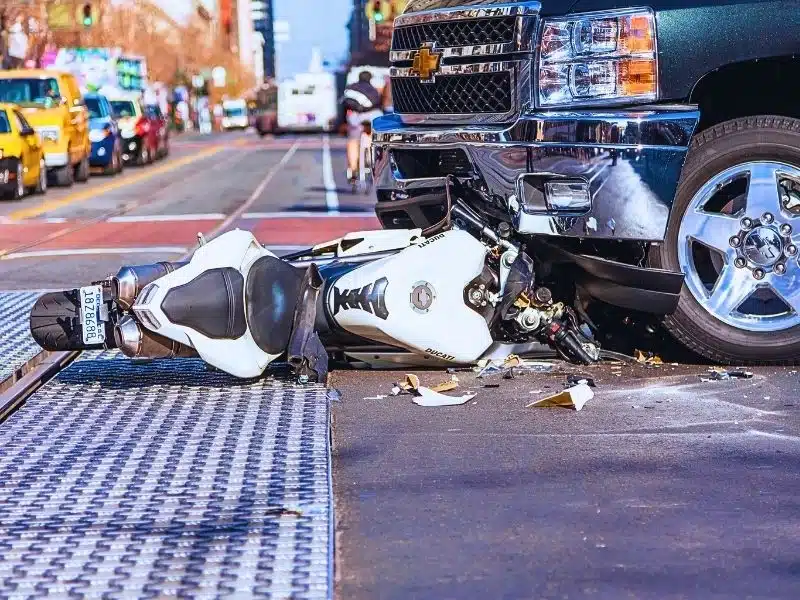The value of a motorcycle accident lawsuit can vary depending on the injuries sustained and the percentage of your fault in the accident. Motorcycle accidents often result in severe injuries, disabilities, and death for riders because they are not protected by an enclosed structure. Depending on the cause of the accident and the severity of the injuries, motorcycle accident lawsuits are often filed to recover compensation.
The Dangers of Riding Motorcycles in Nevada
For many people, the sense of freedom that is felt by riding a motorcycle makes it an appealing means of transportation and leisure activities. However, this sense of freedom and the exhilaration of cruising the open road does not come without increased risk of serious injuries from an accident. Without the structural protection of a motor vehicle like a car or truck, a motorcycle rider involved in a crash is much more likely to suffer severe injuries, or even death, upon impact.
According to the National Highway Traffic Safety Administration (NHTSA), motorcyclists are about 24 times more likely than passenger vehicle occupants to die in a motor vehicle crash. In 2021, there were 5,932 motorcyclists killed on U.S. roads and highways, accounting for 14% of all traffic fatalities. NHTSA data shows this is the highest number of motorcyclists killed in fatal crashes since 1975. While motorcycle crashes continue to occur at all-time highs, NHTSA identifies the common accidents and injuries and addresses the major causes of crashes, including the following factors:
Low Visibility on the Road
One of the leading causes of motorcycle accidents is the failure of other drivers to see the motorcycle on the road. Since motorcycles are considerably smaller than cars, change lanes rapidly, weave between lanes, accelerate at faster speeds, and get caught in vehicle blind spots, drivers of passenger cars do not always see them in time to avoid a crash.
Reckless Driving
While both motorcyclists and motorists are guilty of reckless driving behaviors, reckless motorcycle maneuvers frequently contribute to accidents. These include speeding, weaving in and out of lanes, riding between lanes, passing cars without using signals, pulling in front of a car quickly, and tailgating.
Violation of Traffic Controls
According to NHTSA, many motorcycle crashes occur at intersections with traffic signals such as stop lights and stop signs or unmarked intersections and crosswalks. Since motorcycles have the ability to accelerate at faster speeds than cars, riders often speed through changing traffic signals to beat a red light, run stop signs, and fail to yield to oncoming traffic at a distance. NHTSA data indicates that one-third of multi-vehicle motorcycle crashes result from other drivers turning into the motorcycle’s path because they do not see it coming.
Slide-Outs and Falls
Motorcycle slide-outs and falls account for many accidents that end with severe or fatal injuries. They commonly occur due to the lack of rider training and skills, inclement weather conditions like rain, ice, or sleet on the road, or poor visibility due to light conditions. Accidents often result in broken bones, neck, back, and spinal injuries, body disfigurement, head injuries, and traumatic brain injuries (TBI).
To prevent motorcycle accidents and fatalities, the National Safety Council offers tips, guidelines, courses, and videos on motorcycle roadway safety. Their goal is to educate and train motorcyclists about riding responsibly, minimizing injury risks, and staying safe on the road.
How the Average Motorcycle Accident Settlement Is Calculated
While there is no fixed amount that is awarded in motorcycle accident lawsuits or settlements, insurance companies usually look at the similar factors in each accident. Prior to calculating a payout or settlement, an insurance provider will look at primary factors such as who is responsible for the accident, availability and amount of insurance coverage, and other drivers or motorcycle riders involved in the accident.
Every driver on the road has a duty of care to other motorists, including motorcycle riders. When a collision occurs, it is essential to determine if any motorist violated his or her duty of care by failing to obey the rules of the road or operating his or her vehicle unsafely. If a driver fails to fulfill his or her legal responsibilities, he or she is considered negligent in the eyes of the law.
Motorcycle accident settlements are largely dependent on the insurance company and the responsible driver’s insurance coverage. A standard formula is used to calculate the value of a motorcycle accident settlement, which considers:
- Fault or negligence
- Severity of injuries
- Medical expenses
- Pain and suffering
- Lost wages or income
- Property damage
Typically, insurance companies must determine who is responsible for causing the accident before any type of motorcycle accident settlement can be calculated. The insurance company of the at-fault driver will commonly offer a lump-sum payment to the crash victim to settle the case, but the offer is typically lower than what may be awarded in a motorcycle accident lawsuit filed in civil court. In most types of injury cases, settlements are handled between the at-fault party’s insurance company or attorney and the plaintiff’s (injury victim) motorcycle accident attorney. If a reasonable settlement cannot be reached, the case will typically proceed to a court trial.
Each Party’s Degree of Fault
Determining the cause of a motorcycle accident helps to identify the responsible party or parties and the degree of fault allocated to each party. Common causes of motorcycle crashes include:
- Vehicle drivers changing lanes without checking their blind spots
- Motorists making a left turn and not yielding to approaching motorcycles
- Parked drivers opening car doors into the path of a motorcycle
- Road debris, potholes, and poorly maintained roads
- Defective motorcycle parts that fail to perform correctly
Depending on what caused the crash, there may be multiple parties at fault. For example, if a motorist changes lanes suddenly to avoid hitting a pothole, then hits a motorcycle in the adjacent lane, the fault may be assigned to the motorist and state or local government officials for not properly maintaining the road. Accidents that involve multiple at-fault parties are more complicated and should not be pursued without an attorney to sort out the details.
Calculating the Value of a Case
Putting a value on an accident case is not an exact science, especially when calculating damages for pain and suffering and mental anguish. Some insurance companies and attorneys use a multiplier to estimate the value of a claim. With the “multiplier method”, medical expenses and out-of-pocket expenses are multiplied by a number from 1.5 to 5. Generally, lower numbers are used for minor soft-tissue injuries, while higher numbers are used for severe injuries that may cause disfigurement or permanent disability. The value of a claimant’s out-of-pocket expenses, combined with his or her pain and suffering damages and reduced by his or her percentage of fault, determine the value of a motorcycle accident claim.
When to Hire a Motorcycle Accident Attorney
If you are injured in a motorcycle accident, hire an attorney who handles motorcycle accident lawsuits as soon as possible after your accident. The last thing you need when you are focusing on post-accident recovery and financial loss from medical bills is the stress of handling a legal process without an attorney. Seeking an attorney who handles motorcycle accident lawsuits will be an advantageous move to help ensure you are provided with proper support and legal counsel, and that you receive the motorcycle accident compensation you deserve for your injuries.
Providing Support and Legal Counsel
There are a lot of intricacies when navigating the legal process for motorcycle accident lawsuits. Attorneys can provide you with the resources needed to confidently complete and file all paperwork in accordance with court proceedings. They are accustomed to requesting police and traffic records, obtaining medical information, negotiating medical bills, and ensuring every box is checked to avoid legal pitfalls.
Calculating Monetary Compensation for Damages
An attorney can assess and estimate the full extent of damages by looking at every possible area of loss. The two main types of compensation your lawyer can help calculate are economic losses (tangible losses) and non-economic losses (intangible losses). Economic loss includes medical bills for treatments, surgeries, and medications, lost wages and lost earning capacity or wages while you cannot work, and repair costs for property damage to your motorcycle. Non-economic loss includes compensation for your pain and suffering, emotional trauma, permanent disfigurement, and temporary or permanent disability. Your attorney has the expertise to articulate these damages with supported evidence to justify compensation for both economic and non-economic losses.
Proving Liability
Establishing liability is the ability to provide evidence that the at-fault party is legally responsible for the harm caused to you. An experienced attorney will know what type of evidence to collect to prove liability and when it’s time to call in an expert witness to recreate the accident or provide insight to prove negligence. If the insurance company disputes the claim, your attorney will be ready to move forward with appropriate legal actions to get the best results.
Typical Process of a Motorcycle Accident Lawsuit
Victims of motorcycle accidents have legal grounds for filing motorcycle accident claims to recover compensation if they can prove someone else was responsible for the crash. Factors that can prove the negligence of another driver include:
- Speeding
- Impaired or drunk driving
- Reckless driving
- Failure to yield the right-of-way
- Failure to obey the rules of the road
- Distracted driving
Whatever the circumstances, accident victims will be successful in motorcycle accident lawsuits only if they have evidence showing that another motorist violated the duty of care, and his or her violation caused the injury accident.
Contact the Insurance Company
Before you get to the phase of filing motorcycle accident lawsuits, you must first speak to the at-fault party’s insurance provider. You will need to provide legal evidence that supports another driver’s liability for the accident and medical evidence that supports your injuries. When working through this process, it is best to hire a motorcycle accident attorney who can gather the necessary evidence to support your claim and work with the insurance provider to get you fair compensation. If the at-fault party’s insurance provider is not accepting liability or is unwilling to issue payment for your injuries, your attorney can help you by moving to the next phase.
Mediation
A mediator may be brought in when negotiations with the insurance provider are not successful. The point of mediation is to allow both sides to conclude before proceeding to a lengthy and costly court trial. A mediator, usually chosen by the judge or both parties, will suggest a way of resolving the problem without imposing his or her own opinion or judgment on the issue. If mediation is not successful, your case will likely proceed to a settlement agreement or to a trial in civil court.
Trial
When your case proceeds to a court trial, your attorney will take on the task of making a case in front of a judge or a jury. Since every case and every trial is unique, the time involved in a court trial can vary from several months to several years. Many factors can impact the timeframe of a motorcycle accident case, one example is the severity of the injuries you sustained in the accident. When you consult with your attorney about your case, he or she will provide you with a general overview of how a court trial works, an expected timeline for completion, and what to expect during the trial.
If your case proceeds to a court trial, it will be important to know how long a motorcycle accident lawsuit takes. Your attorney can review your case to address the timeline of your trial and answer any questions and concerns you have about your injuries, medical expenses, and lost wages. Motorcycle accident lawsuits are complex, but your attorney can guide you through the entire process and ensure that you end up with a fair monetary award to cover your damages.





